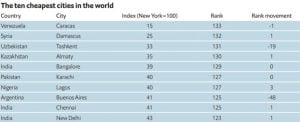New Delhi, Bengaluru and Chennai have been ranked among the top 10 cheapest cities in the latest ‘Worldwide Cost of Living Survey’ by the Economist Intelligence Unit (EIU).
IT capital Bengaluru has been ranked Asia’s cheapest city, being more than twice cheaper than the three most expensive cities, according to the rankings.
These three cities joined the ranks of Venezuela’s Caracas, Buenos Aires in Argentina, Lagos in Nigeria, and Pakistani city of Karachi among others that remain highly affordable when compared to other cities globally.
Mumbai too ranked at 122, making it among the cheapest in the list of 133 cities surveyed by the EIU.
Amongst the most expensive cities in the world, Singapore and Hong Kong topped the rankings, along with Paris, followed by Zurich and Geneva. Singapore has continued to hold on to the ranking for five years now.
Taking an average of the indices for all cities surveyed, the ranking was done using New York as the base city.

“Asia is home to some of the world’s most expensive cities, but also to many of the world’s cheapest cities. Within Asia, the best value for money has traditionally been offered by South Asian cities, particularly those in India and Pakistan. To an extent, this remains true, and Bangalore, Chennai, New Delhi and Karachi feature among the ten cheapest locations surveyed,” EIU said in a release.
“India is tipped for rapid economic expansion but, in per-head terms, wage and spending growth will remain low. Income inequality means that low wages are
the norm, limiting household spending and creating many tiers of pricing as well as strong competition from a range of retail sources. This, combined with a cheap and plentiful supply of goods into cities from rural producers with short supply chains as well as government subsidies on some products, has
kept prices down, especially by Western standards,” the release said.
Economist Intelligence Unit surveyed 400 individual prices across 160 products and services to include— food, toiletries and clothing, domestic help, transportation, utility bills—in each city. Researchers surveyed a range of stores: supermarkets, mid-priced stores and higher priced specialty outlets.
Caracas in Venezuela remained the cheapest because of the ongoing financial unrest in the oil rich nation. The new currency value has varied so much
since its creation and the economy was demonetised compelling people to use commodities and exchange services and personal items like clothing, auto parts and jewellery to purchase basic goods such as groceries, the release said.
As per the study, the global cost of living has fallen to 69 per cent, down from 73 per cent last year. This remains significantly lower than five years
ago, when the average cost of living index across the cities surveyed was 82 per cent and ten years ago was 89 per cent.


